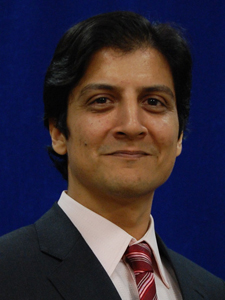InAsia
Insights and Analysis
A Conversation with Pakistani Journalist Wajahat Ali
November 12, 2014
The Asia Foundation’s deputy country representative in Pakistan, Ameena Ilahi, recently spoke with Pakistani journalist Wajahat 
As an accomplished journalist, looking back, what do you consider the highlight or most remarkable moment in your career?
I have plenty of recollections, but it’s hard to isolate a single moment that can be described as the highlight of my career. I have spent about 14 years in journalism, reported from overseas locations, visited conflict zones, interviewed dozens of important personalities, and filed several stories on significant developments in the region.
However, plenty of things are etched in my memory. I can still recall my sense of accomplishment when I saw my first byline. I also remember the day when our television team got hold of a video that showed how Pakistan’s twice-elected prime minister, Benazir Bhutto, was assassinated.
I have not forgotten how an Iranian dignitary stormed out of the room after I interviewed him since he didn’t like my questions or how a senior State Department official declared that her entire interview was off the record when I asked her about Washington’s stance on some sensitive issues between India and Pakistan.
In your view, what are the biggest challenges and opportunities that the future holds Pakistan?
The issue of religious extremism is obviously a big challenge. However, there are other problems as well – and some of them are not even being discussed in this country.
Everyone knows, for instance, that Pakistan’s economy is in a bad shape and, despite last year’s democratic transition from one political administration to another, the country has not really managed to acquire political stability.
However, not many people realize that Pakistan is likely to become a water-scarce nation by 2030. That will have severe consequences for its people. Yet, its politicians and media organizations have largely failed to educate them about this issue and the country desperately needs to start a serious debate on this subject.
On the flip side, Pakistan has witnessed some positive social trends in the recent past as well. A large number of women have started participating in the social, economic, and political life of the country. In my opinion, that is a major development since it can lead to greater economic prosperity and change social attitudes for the better.
This may not happen overnight, but this trend may have a deeper impact on Pakistan’s society than all the violence that we’ve witnessed in the last decade or so.
Based on your leadership experience, what advice would you give young leaders in your country today?
Since we are talking about positive social trends, let me point out that Pakistan has seen a significant increase in the number of private education institutes in recent years. I believe that many of them have produced some very smart graduates who are truly motivated to bring about a positive change in this county.
Many of these young people have started taking a lot of interest in Pakistan’s politics. Some of them have even participated in the movement for restoration of the judiciary – a campaign that, among other factors, resulted in the downfall of Pakistan’s former military ruler, General Pervez Musharraf.
While these young people have their heart in the right place, many of them know very little about their own country. In most cases, they don’t appreciate the complexity of issues confronting Pakistan and quickly fall for populist political narratives and fire-breathing orators.
I think it is very important for young Pakistanis to know who they are. They should travel and explore their country, try to figure out how this society works, and challenge people who try to sell them simplistic solutions to complex problems.
It’s natural for young people to have solid beliefs and strong political convictions. However, they should also learn to question their opinions, be open to new ideas, and cherish their doubts.
As a former grantee of The Asia Foundation, what are your recollections about the experience and how did it help to shape your career?
When I began my fellowship in October 2010, I was trying to learn more about religious radicalization and extremism in Pakistan. My stay in Washington, D.C., put me in touch with some of the leading counterterrorism experts and I found that to be an extremely valuable experience.
My fellowship also made it possible for me to travel quite extensively in the United States, visit a number of conflict resolution centers, interact with the Muslim community, and learn a great deal about American people and their way of life.
I was particularly impressed when I went to The King Center in Atlanta. The center contains surprising details about the civil rights movement in the United States, reminding visitors such as myself that a politically mature nation not only celebrates its glorious past but also preserves and learns from its painful memories.
I also learned a lot about U.S. policy toward Pakistan and its neighboring states and witnessed how developed countries debate issues, generate ideas, and address their outstanding challenges.
The views and opinions expressed here are those of the individual and not necessarily those of The Asia Foundation.
About our blog, InAsia
InAsia is posted and distributed every other Wednesday evening, Pacific Time. If you have any questions, please send an email to [email protected].
Contact
For questions about InAsia, or for our cross-post and re-use policy, please send an email to [email protected].The Asia Foundation
465 California St., 9th Floor
San Francisco, CA 94104
The Latest Across Asia
News
April 17, 2024

2024 Lotus Leadership Awards
Thursday, April 25, 2024, New York City
The Lotus Leadership Awards recognize contributions towards gender equality in Asia and the Pacific








0 Comments